
Actor and cancer advocate Patrick Dempsey explains that when a loved one is diagnosed with cancer, it is important that family members make the moments they share together count.

Actor and cancer advocate Patrick Dempsey explains that when a loved one is diagnosed with cancer, it is important that family members make the moments they share together count.
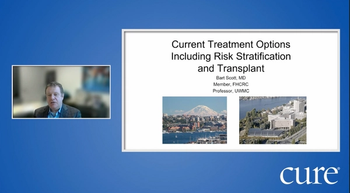
Watch Dr. Bart Scott, from Fred Hutchinson Cancer Center, discuss current treatment options, during the CURE Educated Patient MPN Summit.
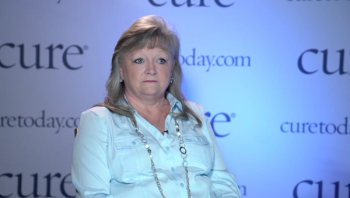
A nurse navigator explains how people in their profession create bonds with their patients and guide them through the cancer experience.
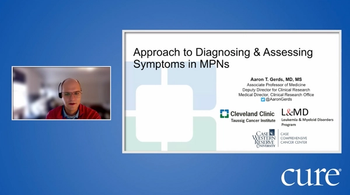
Watch Dr. Aaron Gerds, from Cleveland Clinic Taussig Cancer Institute, discuss approaches to diagnosing and assessing symptoms, during the CURE Educated Patient MPN Summit.
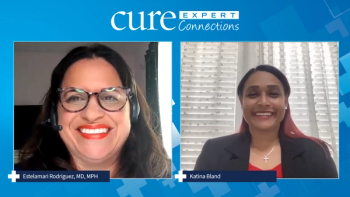
Comprehensive discussion on support for patients receiving therapy for NSCLC, ranging from care team members to education materials to support groups.

Looking at available novel therapy for EGFR exon 20 insertion–positive NSCLC, experts consider how patients can play a part in identifying their best treatment option.
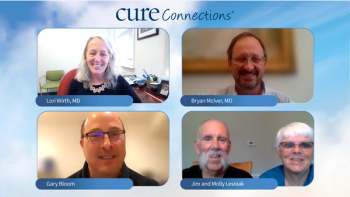
Before closing out their discussion on differentiated thyroid cancer, patients and health care professionals alike consider unmet needs in this space.
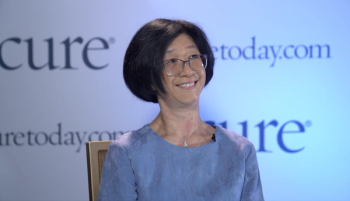
When it comes to learning about their disease, patients with cancer can have different preferences, from wanting to discuss treatments with their providers or read handouts, while others may not want to know much at all.

An expert in the lung cancer and a representative from lung cancer advocacy group talk about the use of amivantamab, a novel therapy approved for treating EGFR exon 20 insertion–positive disease.

A brief discussion on the importance of accessing novel therapy and clinical trials in the setting of EGFR exon 20 insertion–positive NSCLC.

Mental wellbeing is more of a focus than ever before in cancer care, and while treatments continue to get better, there is still a long road ahead, according to Patrick Dempsey.
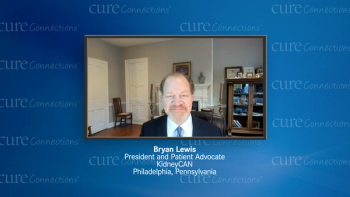
Bryan Lewis, president of KidneyCAN, and Chung-Han Lee, MD, describe unmet needs and future perspectives in the treatment of renal cell carcinoma.

Meryl Uranga describes her path with metastatic clear cell renal cell carcinoma after first treatment, and how it has affected her outlook on her life and future.
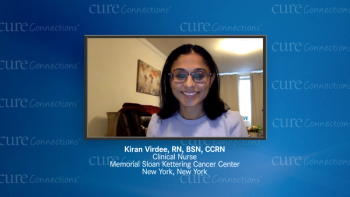
A look at how to consider quality-of-life clinical trial and patient-reported data when treating clear cell renal cell carcinoma with combination therapies.

A brief discussion on therapeutic options one may consider after progression on lenvatinib therapy for iodine-refractory DTC.

Shared practical advice for patients who may be undergoing treatment for iodine-refractory differentiated thyroid cancer.

Meryl Uranga describes her personal experience with managing the side effects of treatment for clear cell renal cell carcinoma.

An overview of side effects commonly seen with lenvatinib plus pembrolizumab for the treatment of clear cell renal cell carcinoma.
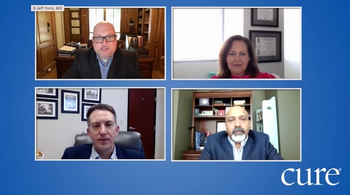
Watch Dr. Thomas Hutson, Dr. Saby George, Dr. Jeff Yorio and Louise Gunter answer questions about combination therapy, during the CURE Educated Patient Kidney Cancer Summit.
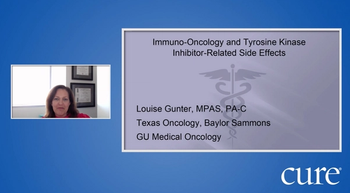
Watch Louise Gunter, from Texas Oncology, discuss IO/TKI-related side effects, during the CURE Educated Patient Kidney Cancer Summit.

Shared insight on how molecular profiling can impact the management of EGFR exon 20 insertion–positive NSCLC and how patient advocacy groups can help patients to interpret test results.

Experts explain the presence and role of EGFR exon 20 insertion mutations in non–small cell lung cancer and highlight the role of molecular profiling.
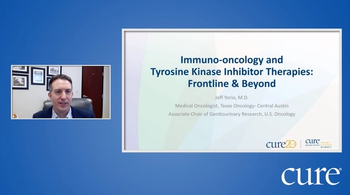
Watch Dr. Jeff Yorio, from Texas Oncology, discuss treatment with the combination of immunotherapy and tyrosine kinase inhibitors, during the CURE Educated Patient Kidney Cancer Summit.
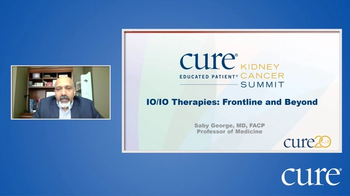
Watch Dr. Saby George, from Roswell Park Comprehensive Cancer Center, discuss treatment with the combination of immunotherapies, during the CURE Educated Patient Kidney Cancer Summit.

Discussion on how best to communicate with care providers while undergoing therapy for iodine-refractory differentiated thyroid cancer.

Considerations for how dosing and dose reductions can be used to optimize use of lenvatinib for iodine-refractory DTC.

Watch Dr. Thomas Hutson, Louise Gunter and Meryl Uranga discuss communicating with a care team about treatment with immunotherapy combined with tyrosine kinase inhibitors, during the CURE Educated Patient Kidney Cancer Summit.

Watch Dr. Thomas Hutson, Louise Gunter and Meryl Uranga discuss side effects and dose reductions after treatment with immunotherapy combined with tyrosine kinase inhibitors, during the CURE Educated Patient Kidney Cancer Summit.

Watch Dr. Thomas Hutson, Louise Gunter and Meryl Uranga discuss the treatment of combining immunotherapy with tyrosine kinase inhibitors, during the CURE Educated Patient Kidney Cancer Summit.

Watch Dr. Thomas Hutson, Dr. Jose Karam, Dr, Naomi Haas, and Kiran Kehoe answer questions about frontline therapy during the CURE Educated Patient Kidney Cancer Summit.